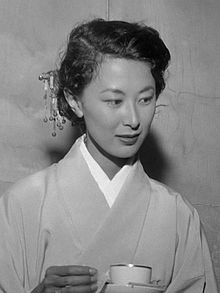Keiko Kishi
Keiko Kishi | |
|---|---|
 Keiko Kishi (1957) | |
| Born | (1932-08-11) 11 August 1932 (age 91) Yokohama, Japan |
| Occupation(s) | Actress, writer |
| Years active | 1951–present |
Keiko Kishi (岸 惠子, Kishi Keiko, born 11 August 1932 in Yokohama, Japan) is a Japanese actress, writer, and UNFPA Goodwill Ambassador.
Life and career
She made her acting debut in 1951 in Noboru Nakamura's film Home Sweet Home.
In the 1950s, David Lean proposed her for the main role in The Wind Cannot Read, which is about a Japanese language instructor in India circa 1943 who falls in love with a British officer, but that idea fell through and Yoko Tani was eventually cast in the role.
Kishi married the French director Yves Ciampi in 1957, and commuted for a while between Paris and Japan to continue her acting career. In 1963 a daughter, Delphine Ciampi, a musician and composer, was born. She divorced her husband in 1975.
Since 1996 she has been a Goodwill Ambassador for the United Nations Population Fund (UNFPA).
In 2002, she won the Japan Academy Prize for best actress for her role in the film Kah-chan.[1]
Filmography (selected)
Film
- Home Sweet Home (1951)
- The Idiot (1951)
- Hibari no Sākasu Kanashiki Kobato (1952)
- The Thick-Walled Room (1953, rel. 1956)
- The Garden of Women (1954)
- Takekurabe (1955)
- Early Spring (1956)
- I Will Buy You (1956)
- Typhoon Over Nagasaki (1957)
- Untamed (1957)
- Snow Country (1957)
- The Snow Flurry (1959)
- Her Brother (1960)
- Ten Dark Women (1961)
- The Inheritance (1962)
- Love Under the Crucifix (1962)
- Rififi in Tokyo (1963)
- Kwaidan (1964)
- Mastermind (1969)
- The Rendezvous (1972)
- Tora-san Loves an Artist (1973)
- The Yakuza (1974)
- The Fossil (1975)
- Akuma No Temari-uta (1977)
- Rhyme of Vengeance (1977)
- Hunter in the Dark (1979)
- Koto (1980)
- The Makioka Sisters (1983)
- Kah-chan (2001)
- The Twilight Samurai (2002)
- Grave of the Fireflies (2005)
- Snow Prince (2009)
Television
- Taikōki (1965), Oichi
- The Eldest Boy and His Three Elder Sisters (2003), Satoko Kashiwakura
- Mango no Ki no Shita de (2019), Rinko
Honours
- Kinuyo Tanaka Award (1990)[2]
- Order of the Rising Sun, 4th Class, Gold Rays with Rosette (2004)
References
External links

- Keiko Kishi at IMDb
- Keiko Kishi at the Japanese Movie Database (in Japanese)
- v
- t
- e
- Chikage Awashima (1950)
- Setsuko Hara (1951)
- Isuzu Yamada (1952)
- Nobuko Otowa (1953)
- Hideko Takamine (1954)
- Chikage Awashima (1955)
- Isuzu Yamada (1956)
- Yūko Mochizuki (1957)
- Fujiko Yamamoto (1958)
- Tanie Kitabayashi (1959)
- Keiko Kishi (1960)
- Ayako Wakao (1961)
- Sayuri Yoshinaga (1962)
- Sachiko Hidari (1963)
- Shima Iwashita (1964)
- Ayako Wakao (1965)
- Yoko Tsukasa (1966)
- Ruriko Asaoka (1975)
- Kumiko Akiyoshi (1976)
- Shima Iwashita (1977)
- Meiko Kaji (1978)
- Kaori Momoi (1979)
- Yukiyo Toake (1980)
- Keiko Matsuzaka (1981)
- Masako Natsume (1982)
- Yūko Tanaka (1983)
- Hiroko Yakushimaru (1984)
- Yukiyo Toake (1985)
- Ayumi Ishida (1986)
- Yoshiko Mita (1987)
- Kaori Momoi (1988)
- Yoshiko Tanaka (1989)
- Keiko Matsuzaka (1990)
- Youki Kudoh (1991)
- Yoshiko Mita (1992)
- Ruby Moreno (1993)
- Saki Takaoka (1994)
- Miho Nakayama (1995)
- Mieko Harada (1996)
- Kaori Momoi (1997)
- Mieko Harada (1998)
- Kyōka Suzuki (1999)
- Sayuri Yoshinaga (2000)
- Yūki Amami (2001)
- Reiko Kataoka (2002)
- Shinobu Terajima (2003)
- Rie Miyazawa (2004)
- Kyoko Koizumi (2005)
- Yū Aoi (2006)
- Kumiko Asō (2007)
- Tae Kimura (2008)
- Haruka Ayase (2009)
- Shinobu Terajima (2010)
- Hiromi Nagasaku (2011)
- Sakura Ando (2012)
- Shihori Kanjiya (2013)
- Sakura Ando (2014)
- Kasumi Arimura (2015)
- Shinobu Otake (2016)
- Yui Aragaki (2017)
- Mugi Kadowaki (2018)
- Masami Nagasawa (2019)
- Masami Nagasawa (2020)
- Mei Nagano (2021)
- Chieko Baisho (2022)
- Sayuri Yoshinaga (2023)
 | This article about a Japanese film actor is a stub. You can help Wikipedia by expanding it. |
- v
- t
- e











